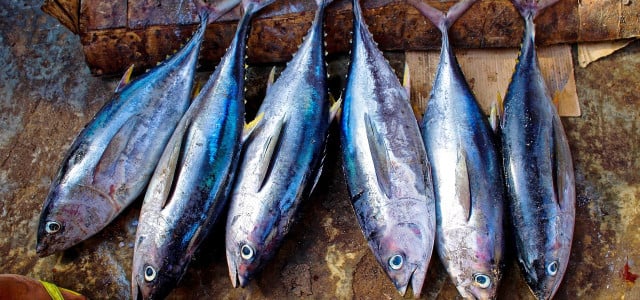
Many people know that tuna contains mercury. What is less known is how high the mercury content of tuna products actually is and what danger it poses to us. More about this here.
You can buy tuna in different variations canned or fresh. The fish is used in different ways in the kitchen as a pizza topping, salad topping, ingredient for pasta sauces or as a tuna steak with side dishes.
Tuna is popular due to its high protein content and the omega-3 fatty acids it contains. However, possible pollutants that the fish absorbs during its lifetime make it less healthy, especially for certain groups of people.
Another problem: According to the WWF, around 60 percent of all tuna stocks are overfished. Thus, tuna consumption is problematic not least from an ecological point of view. You can find out more about this here: Sustainable tuna – is that even possible?
Where does mercury come from and how dangerous is it?
According to the AOK, the fact that mercury gets into tuna at all is mainly due to the industrial combustion of coal and waste. This creates vapors that contain the pollutant and sink into the sea. There, mercury accumulates in plankton. The plankton, in turn, is eaten by certain species of fish. Larger predatory fish, such as tuna, eventually eat the small plankton-eating fish and can accumulate relatively high levels of mercury in their bodies over their lifetime.
According to the Federal Environment Agency, mercury damages the nervous system of animals and can cause certain behavioral changes. In addition, animals with a high mercury content may be less able to reproduce. According to the UBA, mercury can also have fatal consequences for humans. Because the pollutant also gets into the central nervous system in the human body and can cause great damage there. Pregnant women in particular should avoid mercury because the substance can damage the brain development of the unborn child.
Studies confirm that damage to the nervous system caused by mercury manifests itself in fatigue, behavioral changes, headaches, cognitive impairment, hearing loss and hallucinations. Mercury can also limit the function of the cardiovascular system.
Tuna and Mercury: How Risky is the Fish?

(Photo: CC0 / Pixabay / cathryn040)
In the EU, a regulation regulates the permitted maximum level of mercury in food. According to the AOK, the limit for predatory fish is one milligram per kilogram.
The most recent examination of tuna for mercury contained in Germany was carried out by Stiftung Warentest in 2016. Scientists took a close look at 20 canned tuna and tuna steaks. Mercury was detected in every sample, but in none of the products tested were the results above the EU limit. On the contrary: all were far below.
The German Society for Nutrition also classifies tuna as a healthy food. With one or two servings per week, consumers do not have to worry about the mercury content. Only pregnant and breastfeeding women should limit or completely avoid tuna consumption.
By the way: There is no evidence that organic tuna contains less mercury. Other seals may also guarantee less animal suffering and more environmental awareness, but not necessarily lower mercury levels. Finally, mercury is also found in aquaculture tuna. Because even in this form of husbandry, the predatory fish are fed with fishmeal and fish oil, which come from fish caught in the sea.
Conclusion: how much tuna should it be?
According to the DGE, it shouldn’t be more than one or two servings of tuna. From an ecological and social point of view, it makes sense to reduce this amount even further or to do without fish altogether. The reasons for this range from overfishing, cruel fishing methods, killed bycatch to illegal fishing based on criminal practices, slavery and similar massive violations of human rights.
If fish is to be put on the table, we recommend looking out for organic fish. Seals such as those from Naturland stipulate stricter guidelines than, for example, the MSC or ASC seals. You can find out more about this here: Eating fish: You should definitely pay attention to this.
Read more on Techzle.com:
- 6 good reasons to give up fish
- Being Pescetarian: A life of fish but no meat
- Vegan fish: What alternatives to fish are there?